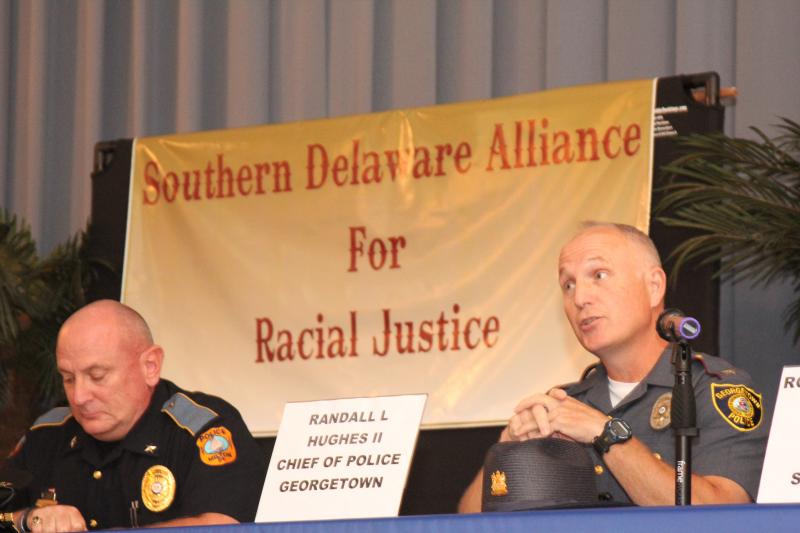Police chiefs grilled by area residents

A panel of police chiefs and troop commanders were on the hot seat Sept. 20 as residents asked whether violent incidents involving police that have occurred across the country could happen here.
“I lay in bed and don't go to sleep until I know my son's home,” said Milton resident Troy Hazzard whose son is a young African-American man.
Another resident said it's difficult to teach her children to respect police when videos of police kicking people in the head – or worse – are broadcast daily.
“What are you explaining to your officers about persons of color and treating people with respect?” she asked during a forum hosted by the Southern Delaware Alliance for Racial Justice.
Amid recent shootings in Alabama and Charlotte, which sparked riots Sept. 20 and 21, alliance member Jay Schiavo asked what police are doing to prevent shootings from occurring here. “It seems like it's happening over and over,” he said.
Police chiefs from Rehoboth Beach, Lewes, Milton and Georgetown were joined by Delaware State Police captains from troops 7 and 4 to explain how their departments are run and what they are doing to bridge trust throughout the community.
“We're here to listen, and we'll make changes if we have to,” said Rehoboth Beach Police Chief Keith Banks.
A Georgetown man shared his story of seeing armed men on his porch in 2008 – the night that Georgetown police officer Chad Spicer was killed. He said he opened his door, unaware that officers were searching for the shooter, and he ended up with guns pointed at his face and officers yelling at him to get on the floor.
“What if I didn't have self contral because I wasn't used to having guns pointed at my face? What if I moved and got shot? Who would've known what happened?” he asked.
The man, who said he had been convicted of a white-collar crime, said the episode was psychologically damaging, and he asked the chiefs if they can say anything to regain his trust.
“I'm not sure I can say anything,” said Georgetown Police Chief Randall L. Hughes II. “But please come and see me, and we can start a conversation and start some healing.”
All chiefs and troop commanders agreed that they've seen footage of unacceptable police behavior.
Milton Police Chief Robert Longo said he supports his officers, but he will tolerate no bad behavior. He said he has reviewed controversial footage of incidents elsewhere, and it disturbs him. He said he has made it clear that his officers must be upstanding citizens.
“I've said you see that? You do that, you're on your own. It's not going to happen on my watch,” he said. “When you're right, I'll defend you to the fires of hell. But if you do something wrong, sorry about your luck.”
In answer to a question on ways to improve the system, Hughes said minimal mandatory sentences and a review of the bail system are in order. Banks agreed judges should have leeway in determining sentences and bail amounts. “You can't say one size fits all,” he said.
Giving details from a Dewey Beach brawl last summer, Troop 7 commander Capt. Alice Brumbley said there should be new guidelines on setting bail. After police arrested people involved in an alcohol-fueled fight, she said, one man urinated in the police car and spit at people, and another punched a hole in the wall at the barracks. Brumbley said she was sure the judge would keep them in jail, but despite all they did, they did not meet the guidelines to be held. “I would like to see more discretion allowed by the judge,” she said.
In defense of police, Brumbley said, regular citizens must remember to be respectful.
“You can give a person the tools to succeed, but they have to choose them,” she said. “I appreciate the courage that you had by asking the hard questions. We're all in this together. Let's keep working in that direction.”
The chiefs and troop commanders said they are committed to regaining public trust, and improving community relations is key.
“For us to lose the trust of the people … we need to make sure we know each other,” Hughes said.
For information on Southern Delaware Alliance for Racial Justice, go to www.sdarj.org.
Melissa Steele is a staff writer covering the state Legislature, government and police. Her newspaper career spans more than 30 years and includes working for the Delaware State News, Burlington County Times, The News Journal, Dover Post and Milford Beacon before coming to the Cape Gazette in 2012. Her work has received numerous awards, most notably a Pulitzer Prize-adjudicated investigative piece, and a runner-up for the MDDC James S. Keat Freedom of Information Award.




















































